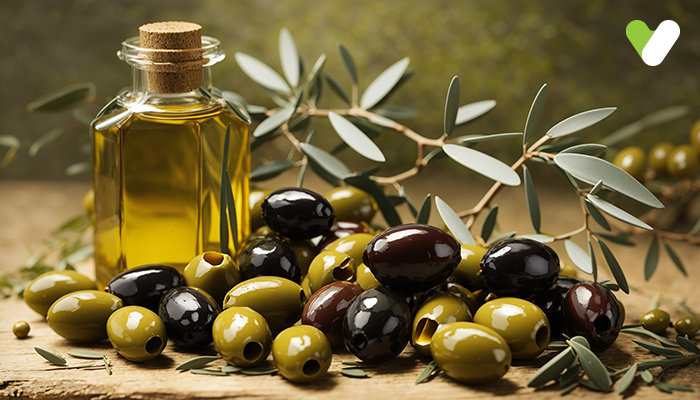Olive oil
Olive oil is a type of oil that is obtained from the fruit of the olive tree. It is commonly used in cooking and as a dressing for salads and other dishes. Olive oil is considered a healthy fat and is a rich source of monounsaturated fatty acids, which can help to reduce inflammation in the body and promote heart health. Additionally, it contains antioxidants, such as vitamin E, which can help to protect the body against free radical damage. Olive oil has a range of culinary uses, and it is used in a variety of beauty and skincare products for its moisturising and nourishing properties.
To get complete information about the health benefits of olive oil you can go online and type benefits of olive oil, olive oil benefits for hair, olive oil benefits for skin, olive oil uses for skin, olive oil benefits for face, or benefits of olive oil for heart in the search box.
Health Benefits of Olive Oil
1. Hair
Olive oil is a natural ingredient that has been used for centuries for its numerous health and beauty benefits. Here are some of the potential olive oil benefits for hair.• Moisturising: Olive oil is rich in healthy fats and antioxidants that can penetrate the hair shaft and provide moisture to the hair, making it soft and shiny. • Prevents hair breakage: Olive oil contains vitamin E, which helps to strengthen hair and prevent breakage. • Reduces dandruff: The anti-inflammatory properties of olive oil can help reduce dandruff and flakiness of the scalp. • Stimulates hair growth: Olive oil can help stimulate hair growth by improving blood circulation to the scalp and promoting the growth of new hair follicles. • Protection against damage: The antioxidants in olive oil can help protect hair from damage caused by environmental factors like sun exposure and pollution. To get good olive oil benefits for hair, you can massage a small amount of it onto your scalp and hair, then leave it on for 30 minutes or an hour before washing your hair with a gentle shampoo. You can also mix it with other natural ingredients like honey, avocado, or egg to create a nourishing hair mask.
2. Skin
Olive oil is not only beneficial for hair, but it also has numerous benefits for the skin. Here are some potential olive oil uses for skin: Moisturising: Olive oil is a natural moisturiser that can penetrate deeply into the skin to keep it hydrated and soft. Anti-ageing: The antioxidants in olive oil can help safeguard the skin from free radical damage and prevent the signs of ageing like fine lines and wrinkles. Calming: Olive oil has anti-inflammatory properties that can help reduce redness, inflammation, and irritation in the skin. Improves skin texture: Olive oil can improve the texture of the skin by providing essential fatty acids and nutrients that support skin health. Helps to heal wounds: Olive oil has antimicrobial properties that can help prevent infections and promote healing of wounds. To get good olive oil benefits for skin, you can apply a small amount to your face or body, and massage it in circular motions. You can also mix it with other natural ingredients like honey, sugar, or salt to create a nourishing and exfoliating body scrub.
3. Heart health
Olive oil contains compounds called polyphenols that have anti-inflammatory properties. Chronic inflammation can damage the lining of blood vessels, which can lead to heart disease. Olive oil contains a significant amount of monounsaturated fatty acids that can be useful in reducing the amount of LDL (bad) cholesterol in the bloodstream. The accumulation of LDL cholesterol is linked to an increased probability of contracting heart disease. Additionally, olive oil can enhance the performance of the endothelium, which is responsible for the lining of blood vessels, leading to better blood circulation and lowering the likelihood of heart disease. Furthermore, olive oil has anticoagulant characteristics, which can prevent blood clotting.
4. Reduces cancer risk
Olive oil is rich in antioxidants, which can help safeguard the body against oxidative stress caused by free radicals. Free radicals can damage cells and increase the risk of cancer. Chronic inflammation can increase the risk of cancer. Olive oil has anti-inflammatory properties that can help reduce inflammation in the body. Hydroxytyrosol and tocopherol present in olive oil have strong anti-cancer properties. Consuming olive oil may help reduce the probability of contracting digestive cancers, such as colorectal cancer. Olive oil may help enhance the effectiveness of chemotherapy and reduce its side effects.
5. Helps in digestion
One of the primary ways in which olive oil can help with digestion is by stimulating the production of bile in the liver, which is necessary for the breakdown and absorption of fats in the small intestine. Olive oil contains a high amount of monounsaturated fats, which are beneficial for digestive health. Additionally, olive oil has anti-inflammatory properties, which may help to reduce inflammation in the digestive tract and improve overall digestive function. Consuming olive oil may help to reduce the likelihood of contracting certain digestive disorders, such as ulcerative colitis and Crohn's disease.
6. Good antimicrobial properties
The primary antimicrobial component in olive oil is a compound called oleuropein, which is found in high concentrations in the leaves and fruit of the olive tree. Oleuropein is effective against a wide range of bacteria, viruses, and fungi. The antimicrobial properties of olive oil can help to prevent the growth of harmful bacteria in the gut, which can lead to digestive issues and other health problems.


